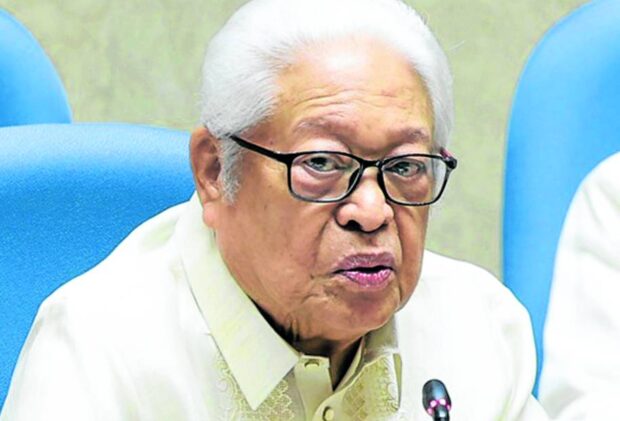
Rerp. Edcel Lagman (Photo from the Facebook page of the House of Representatives)
MANILA, Philippines — It’s time for President Ferdinand Marcos Jr. to intervene in the escalating conflict between the Senate and the House of Representatives over proposals to amend the 1987 Constitution, an Albay Rep. Edcel Lagman, an opposition lawmaker, said on Wednesday.
Lagman made the call to the chief executive to mediate a solution to the bicameral standoff, as his House colleagues expressed confidence that the success of a signature campaign to amend the Constitution via people’s initiative was inevitable despite Senate opposition.
In a statement, Lagman, president of the opposition Liberal Party, said the “brouhaha on Charter change (Cha-cha)” was becoming “divisive and disruptive,” turning attention away from more pressing national issues.
‘Sinister’
As such, he said, Marcos “must broker a solution to [defuse] the impending impasse in order that the executive and legislative departments can truly focus on the overriding crises in the economy, food security, escalating prices of basic commodities, miseducation, ballooning debt stock and debt servicing, and the continuing aggression of China in the West Philippine Sea.”
Lagman’s statement came after senators unanimously signed a manifesto rejecting an ongoing drive to drum up support for constitutional change, which they described as a “sinister and underhanded attempt to change the Constitution by exploiting our democratic process under the guise of a people’s initiative.”
Joint vs separate voting
A people’s initiative is one of three ways to amend the Constitution, requiring the support of at least 12 percent of the electorate.
Based on a copy of the circulating people’s initiative petition seen by the Inquirer, the proposal is to amend the first section of Article 17 of the Constitution on how Congress may change the Charter itself through a vote of three-fourths of all its members.
The proposed amendment specifies that this vote be made “jointly, at the call of the Senate President or the Speaker of the House of Representatives,” in a constituent assembly.
If the campaign succeeds, the two legislative chambers would be authorized to introduce changes to the Charter via joint voting, which the 24-member Senate opposes, as it would be outnumbered by the 310-member House.
The Senate favors separate voting by the two chambers.
12.1 percent gathered
According to Lagman, this question “must be resolved by the Supreme Court in a proper case, and must not be construed by partisans who have ulterior motives on the voting procedure by the constituent assembly.”
But Albay Rep. Joey Salceda, one of the champions of the people’s initiative drive, said the campaign appeared to have already gathered “more than enough signatures.”
As of Wednesday, he claimed, 12.1 percent of all nationally registered voters have already signed the petition, including the needed 3 percent of voters in each congressional district.
It is now up to the Commission on Elections (Comelec) to validate the signatures, Salceda said, adding: “Once and for all, why won’t we listen to the people? Let them speak.”
Echoing this sentiment, Camarines Sur Rep. Luis Raymund Villafuerte, president of the National Unity Party, criticized the Senate for its “preposterous diversionary ploy” by raising the specter of political reforms in the Cha-cha drive.
‘Could be’ a good thing
Villafuerte was referring to the possibility of raising term limits and a “no-election” scenario, to which senators had objected.
In a television interview aired Tuesday night, the president said he was open to “political amendments” to the Charter, such as the lifting of term limits for officials, but not now, as he wished to focus on its economic provisions.
“I think we can have these discussions [on political provisions] later on. But for the present day, my concern is the economic provisions. I do not want to confuse the issue any longer,” Marcos told GMA’s “24 Oras” newscast.
Asked if extending term limits could be a good thing, the president said: “Could be, could be. I don’t know. What are we trying to achieve?”